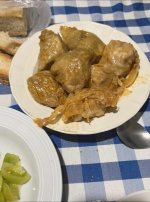d_kakavouli
Active member
I was reading that yiprakia is a specialty in some of Greece (I think I read Northern Greece) for New Year's. First of all, is this true? If it is, has anyone here ever made it? Recipes I have seen show that it is kind of like, stuffed grape leaves or stuffed cabbage (I see both), and it makes me feel like I am missing something. Any advice is appreciated.




